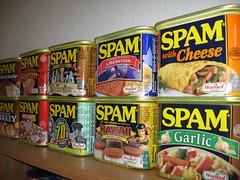Google: We *will* kill search engine spam! (and devalue content farms)
January 24, 2011
On Friday, Matt Cutts at Google published a great piece entitled "Google search and search engine spam that is worth reading for all involved in online content creation. Somewhat predictably, he starts out pointing out that in truth there is less spam in search results than there used to be... but then he clearly accepts the "perception equals reality" mantra and lays out what they are looking to do about it.
This part was interesting, particularly the last line:
To respond to that challenge, we recently launched a redesigned document-level classifier that makes it harder for spammy on-page content to rank highly. The new classifier is better at detecting spam on individual web pages, e.g., repeated spammy words—the sort of phrases you tend to see in junky, automated, self-promoting blog comments. We’ve also radically improved our ability to detect hacked sites, which were a major source of spam in 2010. And we’re evaluating multiple changes that should help drive spam levels even lower, including one change that primarily affects sites that copy others’ content and sites with low levels of original content.
This issue of people copying others' content continues to be an annoyance to me, particularly because content scrapers keep scraping a lot of Voxeo's old content. Anything that can reduce the value in people doing that is a win by me!
Similarly, there are a great number of sites out there operating as "content farms" that just spew out large quantities of low-grade content with the idea that they will increase your SEO/search engine results. Matt Cutts takes them on, too:
As “pure webspam” has decreased over time, attention has shifted instead to “content farms,” which are sites with shallow or low-quality content. In 2010, we launched two major algorithmic changes focused on low-quality sites. Nonetheless, we hear the feedback from the web loud and clear: people are asking for even stronger action on content farms and sites that consist primarily of spammy or low-quality content.
For those of us who are actually spending the time to create quality content online, this is definitely good news.
He ends with a note that Google does not take into account whether or not sites run Google advertising when it is taking action against those sites. I'm inclined to believe them on this point, because at the end of the day, Google's a pretty geeky, hard-core technology company... and Search rules.
It's good to see Google come out with a clear statement like this... and I look forward to seeing what actions they take.
And for us who are creating online content, it's important to monitor whatever changes they make so that we don't wind up inadvertantly having our content somehow devalued amidst the changes.
Image credit: arndog on Flickr
If you found this post interesting or useful, please consider either:
If you found this post interesting or useful, please consider either:
- following me on Mastodon;
- following me on Twitter;
- following me on SoundCloud;
- subscribing to my email newsletter; or
- subscribing to the RSS feed.
